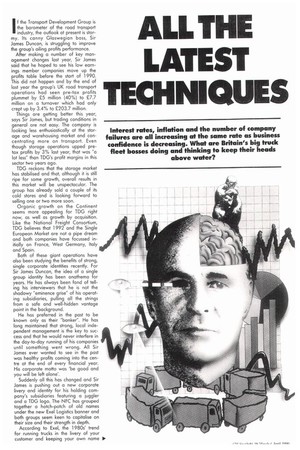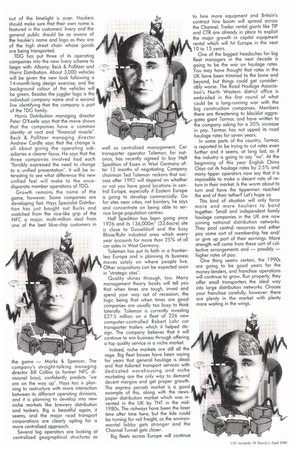ALL THE LATEST TECHNIQUES
Page 64

Page 66

If you've noticed an error in this article please click here to report it so we can fix it.
Interest rates, inflation and the number of company failures are all increasing at the same rate as business confidence is decreasing. What are Britain's big truck fleet bosses doing and thinking to keep their heads above water?
If the Transport Development Group is the barometer of the road transport industry, the outlook at present is stormy. Its canny Glaswegian boss, Sir James Duncan, is struggling to improve the group's ailing profits performance.
After making a number of key management changes last year, Sir James said that he hoped to see his low earnings member companies move up the profits table before the start of 1990. This did not happen and by the end of last year the group's UK road transport operations had seen pre-tax profits plummet by £5 million (40%) to £7.7 million on a turnover which had only crept up by 3.4% to £203.7 million.
Things are getting better this year, says Sir James, but trading conditions in general are not easy. The company is looking less enthusiastically at the storage and warehousing market and concentrating more on transport. Even though storage operations upped pretax profits by 3% last year, that was "a lot less" than TDG's profit margins in this sector two years ago.
TDG reckons that the storage market has stabilised and that, although it is still ripe for some growth, overall results in this market will be unspectacular. The group has already sold a couple of its cold stores and is looking forward to selling one or two more soon, Organic growth on the Continent seems more appealing for TDG right now, as well as growth by acquisition. Like the National Freight Consortium, TDG believes that 1992 and the Single European Market are not a pipe dream and both companies have focussed initially on France, West Germany, Italy and Spain.
Both of these giant operations have also been studying the benefits of strong, single corporate identities recently. For Sir James Duncan, the idea of a single group identity has been anathema for years. He has always been fond of telling his interviewers that he is not the shadowy "eminence grise" of his operating subsidiaries, pulling all the strings from a safe and well-hidden vantage point in the background.
He has preferred in the past to be known only as their 'banker". He has long maintained that strong, local independent management is the key to success and that he would never interfere in the day-to-day running of his companies until something went wrong. All Sir James ever wanted to see in the past was healthy profits coming into the centre at the end of every financial year. His corporate motto was 'be good and you will be left alone'.
Suddenly all this has changed and Sir James is pushing out a new corporate livery and identity for his holding company's subsidiaries featuring a juggler and a TDG logo. The NFC has grouped together a hotch-potch of old names under the new Exel Logistics banner and both groups seem keen to capitalise on their size and their strength in depth.
According to Exel, the 1980s' trend for running trucks in the livery of your customer and keeping your own name I. out of the limelight is over. Hauliers should make sure that their own name is featured in the customers livery and the general public should be as aware of the haulier's name and logo as they are of the high street chain whose goods are being transported.
TDG has put three of its operating companies into the new livery scheme to begin with: Albany; Beck & Pollitzer and Harris Distribution. About 3,000 vehicles will be given the new look following a 14-month-long design exercise, and the background colour of the vehicles will be green. Besides the juggler logo is the individual company name and a second line identifying that the company is part of the TDG family.
Harris Distribution managing director Peter O'Keefe says that the move shows that the companies have a common identity at root and "financial muscle". Beck & Pollitzer managing director Andrew Cardle says that the change is all about giving the operating subsidiaries a clearer focus. He says that the three companies involved had each "forcibly expressed the need to change to a unified presentation". It will be interesting to see what difference this new unified feel will make to the oncedisparate member operations of TDG.
Growth remains the name of the game, however. Some companies are developing fast. Hays Specialist Distribution has just bought out Bucks and snatched from the vice-like grip of the NFC a major, multi-million deal from one of the best blue-chip customers in the game — Marks & Spencer. The company's straight-talking managing director Bill Collins (a former NFC divisional boss), confidently predicts "we are on the way up". Hays too is planning to restructure with more interaction between its different operating divisions, and it is planning to develop into new niche markets like brewery distribution and tankers. Big is beautiful again, it seems, and the major road transport corporations are clearly opting for a more centralised approach.
Several big operators are looking at centralised geographical structures as well as centralised management. Car transporter operator Toleman, for instance, has recently agreed to buy HeIf Spedition of Essen in West Germany after 12 months of negotiating. Company chairman Ted Toleman reckons that success after 1 992 will depend on whether or not you have good locations in central Europe, especially if Eastern Europe is going to develop commercially. Go for sites near cities, not borders, he says and concentrate on being able to service large population centres.
HeIf Spedition has been going since 1926 and its 136,000m2 (33.6acre) site is close to Dusseldorf and the busy Rhine/Ruhr industrial area which every year accounts for more than 25% of all car sales in West Germany.
Toleman has put its faith in a frontierless Europe and is planning its business moves solely on where people live. Other acquisitions can be expected soon in "strategic sites".
Quality shines through, too. Many management theory books will tell you that when times are tough, invest and spend your way out of recession, the logic being that when times are good companies are usually too busy to think laterally. Toleman is currently investing £27.5 million on a fleet of 226 new computer-controlled Robert Lohr car transporter trailers which it helped design. The company believes that it will continue to win business through offering a top quality service in a niche market.
Indeed, niche markets are still all the rage. Big fleet bosses have been saying for years that general haulage is dead and that tailored transport services with dedicated warehousing and niche marketing are the only way to demand decent margins and get proper growth. The express parcels market is a good example of this, along with the newspaper distribution market which was invented in the UK by TNT in the mid1980s. The railways have been the loser time after time here, but the tide could be turning for rail freight, as the environmental lobby gets stronger and the Channel Tunnel gets closer.
Big fleets across Europe will continue to hire more equipment and Britain's contract hire boom will spread across the Channel. Trailer rental giants like TIP and CTR are already in place to exploit the major growth in capital equipment rental which will hit Europe in the next 10 to 15 years.
One of the biggest headaches for big fleet managers in the next decade is going to be the war on haulage rates. You may have thought that rates in the UK have been trimmed to the bone and beyond, but things could get considerably worse. The Road Haulage Association's North Western district office is embroiled in the first round of what could be a long-running war with the big construction companies. Members there are threatening to blacklist aggregates giant Tarmac and have written to the company asking for a 20% increase in pay. Tarmac has not upped its road haulage rates for seven years.
In some parts of the country, Tarmac is reported to be trying to cut rates even further and it seems, at long last, as if the industry is going to say "no". At the beginning of this year English China Clays cut its haulage rates by 2.5% and many tipper operators now say that it is impossible to make a decent rate of return in their market. Is the worm about to turn and have the tippermen reached the end of their tether? Let's hope so.
This kind of situation will only force more and more hauliers to band together. Small and independent family haulage companies in the UK are now joining national distribution networks. They pool central resources and either pay some sort of membership fee and/ or give up part of their earnings. More strength will come from these sort of collective arrangements and — possibly — higher rates of pay.
One thing seems certain, the 1990s are going to be good years for the money-lenders, and franchise operations will continue to grow. Run properly, they offer small transporters the ideal way into large distribution networks. Choose your franchise carefully, however: there are plenty in the market with plenty more waiting in the wings.




































































































































































